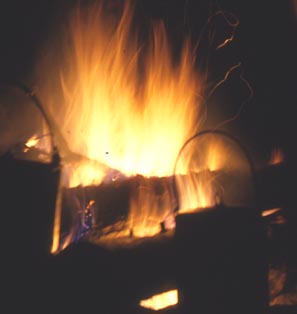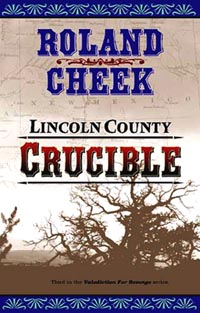a weblog sharing info on outdoor skills and campfire musing by a guy who spends a bunch of time in pursuit of both
CULTURE
WHERE -
TALES ARE TOLD OF
Welcome to Roland Cheek's Weblog
Roland is a gifted writer with a knack for clarifying reality. Looking forward to more of his wisdom
- Carl Hanner e-mail
Aldo Leopold once wrote: For one species to mourn the death of another is a new thing under the sun. The Cro-Magnon who slew the last mammoth thought only of steaks. The sportsman who shot the last [passenger] pigeon thought only of his prowess. The sailor who clubbed the last auk thought of nothing at all. But we, who have lost our pigeons, mourn the loss. Had the funeral been ours, the pigeons would hardly have mourned us. In this fact, rather than in Mr. DuPont's nylons ... lies objective evidence of our superiority over the beasts.
To access Roland's weblog and column archives
Tip o' the Day
There've been a few times when a fire became more than a mere pleasant accompaniment to outdoors adventure -- Like the time I was alone, bringing out the last of our hunting camp on the first day of December. The temperature hovered below zero, and two feet of snow lay across the frozen land. And I lost a mitten.
It was while my packstring trundled silently along the trail. I took the mitten off to dig in my saddlebag for a sandwich. After I'd eaten the sandwich, and wished to slide my already freezing fingers into the fur-line glove, I missed it! My first thought was to stop the packstring and flounder back to look for it. But there were eight laden packhorses back there and I had no idea how long it'd been gone. Besides, it would certainly have been buried by the churning horse hoofs. Later though, a quickly kindled fire from dead fir limbs broken from trees near the trail saved deadened fingers.
Another time a friend and I returned to road's end after backpacking all day in a drenching rain. We reached a three-sided Forest Service shelter well after dark, scrounged what poor wood we could find with a flashlight, then huddled around a fluttering fire that seemed as if it'd never take off. Then I remembered the battered piece of magnesium wedge (used by tree cutters to tip a tree in a desired direction). An old sawyer had told me they sometimes used battered pieces of old wedges to make warming fires burn hot.
Dumb me! I threw the piece of magnesium (not even as large as half a man's billforld) into our fitful fire, then promptly forgot about it while I tried to boil coffee, water for soup, heat campwater for rinsing hands and dishes.
For the uninitiated, magnesium is one of the most difficult metals to weld because its melting temperature and its flashpoint is so close together -- in the neighborhood of 500 degrees. Apparently, some point at the bottom of our little fire, the temperature hovered at 500 degrees.
My friend and I had piled wet wood all around our campfire in hopes it would dry sufficiently to allow us to cook breakfast the following morning. Meanwhile, our coffee water and our soup water and our dishwater barely simmered. Then the magnesium caught!
Instantly the temperature of our fire shot to 2,000 degrees! Flames leaped toward the shelter's shingled roof! Instantly our coffee pot boiled over, the soup pan boiled dry and melted, Luckily I managed to kick the dishpan out into the drumming rain. The wet wood we had scattered around the fire instantly steam-dried, began smoldering, then turned to blaze! My friend and I threw coats over our faces and tried to push the wood out into the rain with long sticks. For a moment we thought we'd lose the building.
Then the magnesium chunk burned out and the flames receded to lick merrily at the charred firewood left in the firepit. Sheepishly we gathered our scattered wood, now all dry, and ricked it along one wall. Then we started cooking all over again.
No, Roland Cheek hasn't been in a gunfight at the O.K. Corral or punched dogies down the streets of Abilene. But he has straddled rawboned ponies over 35 thousand miles of the toughest trails in all the Northern Rockies and spent five decades wandering the wild country throughout the West. Now, after crafting six prior nonfiction books, hundreds of magazine articles, and thousands of newspaper columns and radio scripts about his adventures, the guy has at last turned his talent to Western novels, tales from the heart, dripping with realism, and based in part on a plethora of his own experiences.
* * *
SHINE OR WHINE IN TWO-OH-OH-NINE
Many folks view turning over a New Year like turning over a new leaf. Their thinking is skewed, though. Opportunity presents itself on a daily basis, not just yearly. A new leaf can be turned over at any time, anywhere, by anyone. The way I get it, Paul spotted his blinding flash of light while on the way to Damascus--reports of the incident says nothing about it occurring on New Year's Day. The salient point is that Paul altered his behavior from that day forth, New Years or no.
My own personal behavioral alterations are mundane; I take out the garbage when Jane tells me to do so. Only once did it occur to me that I should say she must wait her asking until until New Year's. Amazing! Within but a few seconds I'd already begun my transformation ride.
How many of you know of Ernst Werner Techow's journey of forgiveness after being a party to the June, 1922 assassination of Walter Rathenau, Foreign Minister of Germany. The Foreign Minister's chief crime--in the view of a band of right-wing zealots--was that he was Jewish. Rathenau was machine-gunned while driving to work by two men passing the Minister's auto. Ernst Techow drove the get-away vehicle.
Techow was the only one apprehended for the crime; the two actual gun-wielders committed suicide while in a shoot-out with the police. Techow was sentenced to 15 years imprisonment, of which he served five before being released for good behavior.
Genuinely remorseful for his participation in a crime he belatedly realized was related to racial-hate, Techow joined the French Foreign Legion. Then when the Nazis overran France in the early stages of World War II, Techow is credited with helping to spirit over 700 Jews from Marseilles to Spain during 1940-41--at the risk of his own life. THAT, good people, represents transformation.
Odds of Ernst Werner Techow change-of-heart occurring on New Year's Day is precisely 364 to 1.
Not many of us will bear Ernst Werner Techow's burden, nor have Ernst Werner Techow's opportunity to make amends. But if we'll be true to ourselves, each of us have some shameful bones in our closet, be it shoplifing a 49-cent steering knob for my bicycle handlebars from a "Monkey Ward" store, as I did at age 11, or racial or political or religious intolerance occurring on street corners today.
Naturally most of our New Year's transformations are driven by recognition of our own internal weaknesses and the concommitant result that we resolve to do better. I well recall at least three New Year's Days during my long and sordid existence that I've resolved to never again let demon rum pass my lips. Unfortunately, backsliding on New Year's resolutions are almost as prevalent as the resolutions themselves. That I've made the same anti-demon rum pledge at an understated minimum of three times might imply to a perceptive observer that I cannot always be trusted to keep some vows.
In fact, upon reflection, I can't remember a single New Year's vow that I've succeeded in carrying through to the bitter end. No doubt about it, I'm an apostate, a recanter, a defecter. But I can remember a few resolutions made God knows when, or even where. But I do know positively why. Sometime between knee pants and puberty I made a vow to fish more often. And somewhere, sometime, I decided if I was going to admire the symmetry of a buck's antlers hanging over a barn door, it might as well be my buck's antlers hanging over my barn door.
I made more or less the same kind of decision about a wife, too: if I was going to ogle somebody's knockout-beautiful wife, it maybe ought to be my own. (Or maybe it was her that made that resolution--I don't know.)
The truth is, she made a lot of resolutions for both of us, not all for which I'm sorry. We're eating healthier because of her determination to serve healthy stuff. Ours is a healthy regimen of active exercise, and she plays a major role in our accomplishing that goal regularly. But it was my idea to lead us into outdoors adventure, and today she's as much at home climbing a mountain peak as am I.
If there's a moral somewhere in this New Year's diatribe it might best be found in the idea that we should not wait for New Year's Day to make life-changing, or lifestyle-changing, or bad-habit changing, or health-improving decisions. Instead, we should make those commitments anytime we're ready to see them through to the end.
Above all, though, we should go fishing and hunting. Hug our friends. See the bad guys on their way to hell. Or we can spend 2009 complaining about having to wait until next New Year's before making changes for the better.
Roland Cheek wrote a syndicated outdoors column (Wild Trails and Tall Tales) for 21 years. The column was carried in 17 daily and weekly newspapers in two states. In addition, he scripted and broadcast a daily radio show (Trails to Outdoor Adventure) that aired on 75 stations from the Atlantic seaboard to the Pacific Ocean. He's also written upwards of 200 magazine articles and 12 fiction and nonfiction books. For more on Roland, visit:
www.rolandcheek.com
Recent Weblogs
Tuesday, January 6, 2009
for more info about these and other Roland Cheek books
There's a bunch of specific info about Roland's books, columns, archives and radio programs. By clicking on the button to the left, one can see Roland's synopsis of each book, read reviews, and even access the first chapter of each of his titles. With Roland's books, there's no reason to buy a "pig in a poke."
for detailed info about each of Roland's books
Read Reviews
Read their first chapters
For interested educators, this weblog is especially applicable for use in history, outdoor/nature and journalism classes.
Roland, of course, visits schools. For more information on his program alternatives, go to:
NEXT WEEK:
ICE FISHING: BLOOD SPORT
www.campfireculture.com
Award-winning Western writer Richard Wheeler says of Roland's novels:
Like Louis L'Amour, Roland Cheek knows how to start a story at a gallop and hold the reader to the last page. he writes richly and authentically about the Old West, drawing from an encyclopedic knowledge of his subject.
1st in series
2nd in series
3rd in series
4th in series
5th in series
6th in series
to send this weblog to a friend
to tell Roland what you think of his Campfire Culture weblog
to visit Roland's newspaper columns and weblog archives
source links for additional info





